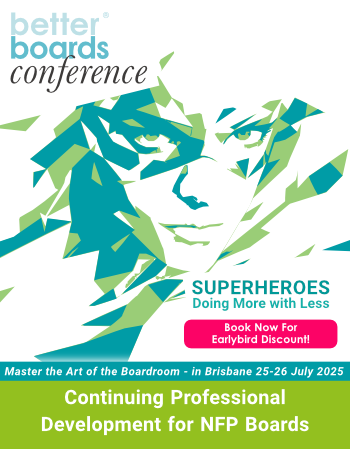performance-metrics
How To Perform a Self-Health Check-up for NFPs
Published: February 11, 2013
Read Time: 6 minutes

“How do we know that we are doing well?”
“Do we really need to ask and pay someone else to say that we are a healthy organisation or an organisation in need of help?”
“We did ask someone else before about whether we are performing well or not, and we realised that we knew all the answers when the outsider started to talk about the solutions we were searching for. We didn’t exactly know the questions though.”
These are some of the questions and comments people working in non-profit organisations shared with me during my career as a researcher and a trainer in Non-profit governance and management. I normally say that you might need a health checkup to make sure that your organisation is in good health and you may well be able to do it yourself. A board health checkup focusing on the governance and management of non-profit organisations (NPOs) is like an insurance assessment for managing risks and as it is said prevention is better than cure.
Why do we need a health checkup?
Governance and management are an inherent requirement for the efficient functioning of all organisations. Organisations with different structures, pursuing specific goals and functioning in a variety of environments make distinctly differing demands on their management and governance irrespective of the sector such as public, business and the third sector. The Non-Profit Sector has grown in numbers and scope around the globe because of the failure of the market and State to meet human needs. As a result of this, organisations in the Non-Profit Sector have entered an era of fierce competition for dwindling resources from both the private and public sectors. In this context, their survival depends on each organisation’s efficiency in sourcing and managing the available limited resources as well as its effectiveness in realising its vision and mission and meeting service user needs.
Good governance and management are considered the key to efficiency and effectiveness. These two areas are a growing concern not only for organisations, but also for the governments regulating their operational environment and the donors supporting operations. Further to that, accountability dimensions need to be taken into account such as the organisation itself, in terms of values and ethics, internal bye-laws, structures and systems as well as the service users in terms of the impact it creates on the quality of life for the vulnerable and disadvantaged people the organisation tries to help.
Research suggests that the issues confronted by NFPs range from financial management to technological challenges such as managing Facebook accounts for the organisation to meet the increased demand for creating a space and being visible in the community to attract support for its existence. Defining governance and management standards and success is difficult for NPOs since there are no uniform criteria. NPOs are not only varying from industry to industry but also within the same industry. This makes assessing governance and management of NPOs a difficult task. Fortunately, for the last two decades, many organisations and individuals have been involved in developing these management practice standards for NPOs such as International NGO Training and Research Centre (INTRAC), Management Accounting for Non Governmental Organisations (MANGO), Aga Khan Foundation and NGO Management School, Switzerland. All these efforts resulted in the development of self -assessment tools for NPOs and NPOs can now assess and improve their governance and management on their own based on these standards. The Do it Yourself (DIY) nature of these tools made them easily accessible and user friendly and they are also free in most cases. A self-health checkup could help NPOs to realise their strengths and weaknesses and thus improve their standards and functioning.
Who should do this?
The DIY tools assess practices in organisational governance and management of non-profit organisations. As the boards of directors are entrusted with the task of safe guarding the vision and mission of these organisations, they are often required to show superior leadership skills and motivate staff and other stakeholders to strategise organisational goals. In this process, they might need to look at how organisational management practices such as finance management, office management, human resource management etc. are helping to realise their goals. So it would be safe to say that boards of directors are required to be a part of this. On the other hand, managers and other staff are operationalising an environment and appropriate procedures, systems, programmes and projects that would directly serve the purposes of the organisations. So they are also required to know that how well they are doing based on standard practices.
What is involved?
The available self-assessment tools are based on good practices/practice standards in aspects of organisational capabilities such as
- Governance & Leadership (Board, CEO, Policies & procedures),
- Strategic planning & management (Vision, Mission, Objectives, Values, ethics &Culture)
- Service delivery & Quality assurance (Programme planning, implementation and evaluation – Project management)
- Legal responsibilities & awareness (Registration, tax etc.)
- Human resource development & management (paid staff, volunteers-recruitment, development and retention)
- Systems, asset & office management (IT, procedures)
- Financial management (planning, budgeting, fund raising, accounting, reporting, auditing, controlling, investments and compliance)
- Stakeholder/relationship/partnership engagement and management (social marketing) and research and innovation.
Some of the available tools cover all the aspects of these capabilities and some cover only one or two. Different organisations have developed alternative tools and should be used with caution as they may reflect regional or national circumstances (eg.; differences in registration, financial reporting, tax status etc. in different countries). Ideally, organisations should take an eclectic approach to measuring all aspects of organisational capabilities. Health check-ups are about measuring how well our organisations are doing as well as assessing the risk level against these good practice standards.
Good practices are identified as a statement of the best practice or practice standards defined in a five-point scale, or with 3-4 response options such as met, partially met, never met for the organisations to rate their performance.One capability area may have several questions/statements. The statements may also be rated on their prominence as Essential, Recommended & Additional. The statements are normally scored with values ranging from 0-5. There are minimum and maximum scores depending on the number of questions each area may have. You may need to add your ratings together for each question under a category such as “governance” and divide it by the total number of questions to get a summary of your ratings for that particular area of organisational capacity. The tool’s instructions will inform you about how to interpret these scores. Generally if your organisation’s score is less than half of the total score, your organisation may need some intervention to improve its capabilities.
What are the available tools?
It is not my intention to describe each tool and analyse their advantages and disadvantages here as it is outside of the scope this article. I will, however, list them here and provide website links so that you can access them and tailor them to your organisational needs. It may involve a bit of research, but it is a necessary thing to do.
Available Organisational Assessment tools
- Checklist of Non Profit Organisational indicators edited by Carter McNamara published by Greater Twin Cities United Way, USA.
- Financial health checklist published by Mango, UK, 2009.
- Organisational management checklists published by NGO management association, Switzerland.
Other Useful Resources
Non Profit Management training centres
Research on NPO sector
- Centre for Civil Society Studies
- VOLUNTAS: International Journal of Voluntary and Non Profit Organizations-
- Non-profit and Voluntary Sector Quarterly
- Non-profit Management and Leadership
- Australia and New Zealand: Third Sector Review
Share this Article
Recommended Reading
Recommended Viewing
Author
-
Programme Convenor - Social Work
The University of Waikato
- About
-
Albert currently works as a lecturer in the Social Work programme at University of Waikato, New Zealand. He is currently conducting PhD level research on Management and Governance of Non Governmental Social Service Organisations in New Zealand at the University of Canterbury, New Zealand. Originally from India, Albert has also lectured in social work and has been a consultant to many non-profit organisations.
Found this article useful or informative?
Join 5,000+ not-for-profit & for-purpose directors receiving the latest insights on governance and leadership.
Receive a free e-book on improving your board decisions when you subscribe.
Unsubscribe anytime. We care about your privacy - read our Privacy Policy .







